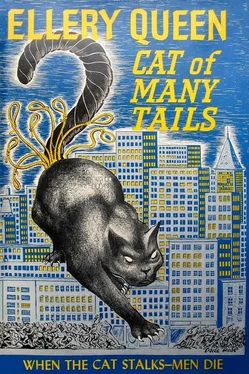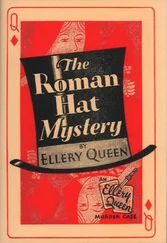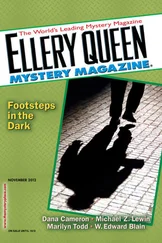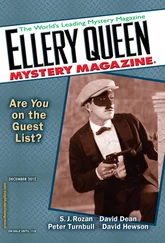“Lawyers?”
“Oh, that business of his grandfather’s estate.”
“His grandfather,” said the Inspector. “Now, let’s see. That would be...”
“Mrs. McKell’s father, Inspector. He was a very rich man who died when Jimmy was 13. Jimmy and his sister were their mother’s father’s grandchildren and he left a big estate for them in trust. The income from the estate was to start being paid when each grandchild reached the age of 30. Monica’d been collecting her share for seven years, but Jimmy wasn’t due to start for five years more, or whenever it is. The only thing is, now Jimmy will get the whole thing, because under his grandfather’s will if one of the two grandchildren died the entire estate — principal and income — was to go to the survivor at once. There’s millions in the estate and Jimmy’s sick about the whole thing, I mean the way it’s coming to him. Through Monica’s death and all... what’s the matter?”
Ellery was looking at his father. “How was that missed?”
“I don’t know. None of the McKells said a word about an existing trust from an outside source. Of course, we’d have found out eventually.”
“Found out what?” asked Celeste fretfully.
Neither man answered.
After a moment she got up. “Do you mean...”
“The fact is,” said Ellery, “the death of Monica McKell means a fortune to her brother, who lives on a reporter’s salary. It’s what’s known in our depressing profession, Celeste, as a motive.”
“Motive.”
Rage reshaped her. It was an alteration that began deep inside, like the first tiny release of energy in the heart of an explosive. Then it burst, and Celeste sprang.
Even as he felt the rip of her fingernails, Ellery thought absurdly: Like a cat.
“To use me to trap him!”
She kept screaming as Ellery seized the clawing hand and his father came up fast from behind.
“To think Jimmy’d do a thing like that! To think it! I’m going to tell him!”
Sobbing, she wrenched away and ran.
They saw Jimmy McKell step out of the basement areaway as the front door burst open and Celeste Phillips flew out. He must have said something, because the girl whirled, looking down. Then she ran down the brownstone steps and hurled herself at him. She was crying and talking wildly. When she stopped, he said something to her very quietly and she put her hand to her mouth.
Then a cab veered inquiringly toward the curb and Jimmy held the door open and Celeste crept in. He got in after her and the cab raced off.
“End of an experiment,” sighed Ellery. “Or the beginning of one.”
Inspector Queen grunted. “Do you believe that baloney you sliced for McKell about ABC, D, X, and what have you?”
“It’s possible.”
“That somebody connected with only one of the seven murders is behind all of them as a coverup?”
“It’s possible.”
“I know it’s possible! I asked you if you believe it.”
“Can you be certain someone connected with only one of the seven murders isn’t behind all of them?”
The Inspector shrugged.
Ellery tossed the stained handkerchief on the sofa. “As far as Celeste and Jimmy are concerned, the way they came to me logically admitted of suspicion. The fact that each one has just disclosed information damaging to the other, viewed without sentiment and on its own merits, only enlarges the suspicion area. Still, I’m willing to go on belief — I don’t believe either is the Cat, no. There’s a factor that goes beyond logic. Or maybe,” said Ellery, “maybe I’m rusty. Do you suppose that could be it?”
“You’re not convinced.”
“Are you?”
“You’ll be questioning me next!”
“Or myself.”
The Inspector reached for his hat, scowling. “I’m going downtown.”
The Cazalis phase of the investigation ran into shoal water immediately.
As originally charted by Dr. Cazalis, the psychiatric inquiry was to be a fishing expedition of all the specializing physicians in the local field, a sort of grand fleet sailing under a unified command. But it became evident that the expedition would have to be remapped. Each specialist, it appeared, was his own captain, guarding his nets and lines and the secrets of his fishing grounds with Japanese zeal. He regarded his catch as his exceptional property and no other fisher should have them.
To the credit of most, their scruples were largely ethical. The sanctity of the physician-patient confessional could not, in propria persona, be invaded even by other physicians. Dr. Cazalis surmounted the first obstacle by proposing the adoption of a published-case history technique. Each psychiatrist was to go through his files, select his possibilities on the broadest base, and make transcripts in which all identifying allusions were to be altered, leaving only the initials of the patient for reference. This suggestion was approved. When the case histories came in a five-doctor central board, headed by Dr. Cazalis, was to go work. The board was to consider each history, rejecting those which in the consultative view were unlikely. By this method many persons would be screened out while being spared the violation of their privacy.
Here, however, agreement went aground.
How were the remaining cases to be treated? Anonymity could be preserved only so far. Then names must be disclosed.
The inquiry almost foundered on this reef.
For therapeutic reasons the type and class of suspect Dr. Cazalis’s plan involved could not be handled as the police handled the drily haul of the dragnet, even assuming that the problem of protecting the confidences of the consulting room could be solved. Inspector Queen was directing and co-ordinating the activities of over three hundred detectives under orders to stop at nothing. Since early June each morning’s lineup had been crowded not merely with dope addicts, alcoholics, old sex offenders, and criminal psychopaths with penal or institutional records but also with vagrants, prowlers, “suspicious characters” of all descriptions — a category which in three months had swollen alarmingly from the internal pressures of the case. In the high prevailing temperature, civil rights had tended to shrink as official frustration expanded. There had been typhoons of protest from all quarters. The courts had been showered with writs. Citizens had howled, politicians had roared, judges had thundered. But the investigation was plunging ahead in the teeth of all this. Dr. Cazalis’s colleagues would have been reluctant to submit their patients to normal police procedures; how, they demanded, could they be expected to turn their patients over to the authorities in this stormy, overheated atmosphere? To many of their charges even an ordinary questioning session would raise dangers. These people were under treatment for mental and emotional disorders. The work of months or years might be undone in an hour by detectives callously intent only on finding a connection between the suspect and the Cat.
There were other difficulties. The patients originated for the most part in the prominences of the cultural geography. Many were socially well-known or came from well-known families. The arts and sciences were heavily represented, the theatrical world, business, finance, even politics. Democracy or no democracy, said the psychiatrists, such people could not be thrown into the lineup as if they were poolroom loiterers or park prowlers. How were they to be questioned? How far might the questions go? Which questions should be avoided and who was to decide? And who was to do the questioning, and when, and where?
The whole thing, they said, was impossible. It took the better part of the week to work out a plan satisfactory to the majority. The solution took-shape when it was recognized that no single modus operandi was practicable. There would have to be a separate plan, as it were, for each patient.
Читать дальше












